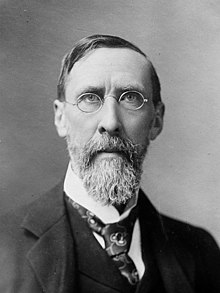George Eulas Foster
Sir George Eulas Foster (born September 3, 1847 in Carleton County , Province of Canada , † December 30, 1931 , Ottawa ), GCMG , was a Canadian statesman , member of the House of Commons and the Senate . He has served as minister to several Canadian governments .
Live and act
Foster studied Classical Studies ( Classics ) at the University of New Brunswick in Fredericton and graduated in 1868 with a bachelor - degree from. In the following years he taught at various schools in New Brunswick. Between 1872 and 1873 he stayed for an academic year in Edinburgh and Heidelberg . In 1873 he became a professor at the University of New Brunswick. After teaching for six years, Foster entered politics and was involved in the abstinence movement .
In 1882 he was elected to the House of Commons for the Conservatives . In 1885 the Canadian Prime Minister John Macdonald appointed him to the government and made him Minister of Fisheries and the Navy . In 1888 he became Minister of Finance and Treasurer ( Receiver General ). He also held this ministerial office in the subsequent governments of John Abbott , John Thompson , Mackenzie Bowell and Charles Tupper .
In 1896 the Liberal Party under Wilfrid Laurier took over the government. Foster became a leading member of the conservative opposition. In 1911 the conservative politician Robert Borden was able to bring about a change of government and was elected prime minister. Foster joined the government as Minister of Commerce and was also a member of the second Borden cabinet .

After the First World War, Foster was a Canadian delegate to the Paris Peace Conference of 1919. He is in the painting The Signing of Peace in the Hall of Mirrors by William Orpen displayed, the signing of on the peace treaty by the German envoy in the Mirror Hall of the Palace of Versailles shown becomes. In 1920 Foster led the Canadian delegation to the first assembly of the League of Nations in Geneva . In 1921 he was appointed to the Canadian Senate, of which he was a member until his death.
Foster was a strong believer in the protection of Canadian industry and preferential trade within the British Empire . In 1914 he was beaten to the Knight Grand Cross of the Order of St Michael and St George (GCMG). In 1916 he founded the National Research Council of Canada and in 1918 the Dominion Bureau of Statistics , which became Statistics Canada in 1971 .
Foster was a well-known author of speeches, lectures and essays, some of which were published in print. He coined the term splendid isolation , which describes the foreign policy of the United Kingdom in the late 19th century. The main goal was to maintain the European balance of power by avoiding contractual obligations or permanent alliances with other great powers. In 1896 Foster first used the phrase in a speech in the Canadian House of Commons. A few days later, the term splendid isolation appeared as a headline in The Times newspaper and was soon used in speeches by British politicians.
Foster was considered intelligent, competent, and hardworking. Prime Minister Robert Borden found him noteworthy because he lacked tact, headed a chaotic office where cabinet papers could disappear, and had a penchant for stretching his jurisdiction in all directions. Although he was never valued, Foster was respected for his administrative skills.
family
George Eulas Foster's father was John Foster († 1888), who grew up in Wakefield , Québec . His mother Margaret Foster, nee Heine, came from Studholm in New Brunswick. She died in 1850 when George Eulas Foster was not yet three years old. Foster married Adeline Davis (1844-1919) in Chicago in 1889 . After her death, Foster married Jessie Allan in Geneva in 1920 . No children emerged from either association. The grave of George Eulas Foster and his second wife is in Beechwood Cemetery in Ottawa.
Works (selection)
- The Canada temperance manual and prohibitionist's handbook. Toronto, 1881. ( online )
- with Charles Tupper: A little inside history of how the government treated the bank note contract. 1897.
- Some problems of empire. Royal colonial institute , 1912.
- The Naval Policy of the Borden Government. Ottawa 1912.
- Some phases of the war situation. Canadian Club, Ottawa 1915.
- The Enlargement of Canadian Trade. 1914.
- Citizenship: The Josiah Wood lectures. Sackville, 1927.
literature
- Arnold Winterbotham (Ed.): Canadian addresses. Bell & Cockburn, Toronto 1914. (A Collection of Foster's Discourses and Treatises)
- William Stewart Wallace (Ed.): The memoirs of the Rt. Hon. Sir George Foster. Macmillan, Toronto 1933.
Web links
- Parliament of Canada: The Right Hon. Sir George Eulas Foster
- Dictionary of Canadian Biography: Sir George Eulas Foster
- Quebec History: Sir George Foster
- Encyclopedia Britannica : Sir George Eulas Foster
- Sir George Eulas Foster ( English, French ) In: The Canadian Encyclopedia . Retrieved September 16, 2019.
Individual evidence
- ^ A b John W. Wheeler-Bennett: A Wreath to Clio: Studies in British, American and German Affairs. Palgrave Macmillan, London 1967, ISBN 9781349816637 , p. 22.
- ↑ a b Elizabeth Knowles (Ed.): The Oxford Dictionary of Quotations. University Press, Oxford 1999, ISBN 0198601735 , p. 544.
| personal data | |
|---|---|
| SURNAME | Foster, George Eulas |
| BRIEF DESCRIPTION | Canadian politician |
| DATE OF BIRTH | September 3, 1847 |
| PLACE OF BIRTH | Carleton County , New Brunswick , Province of Canada |
| DATE OF DEATH | December 30, 1931 |
| Place of death | Ottawa , Ontario , Canada |


